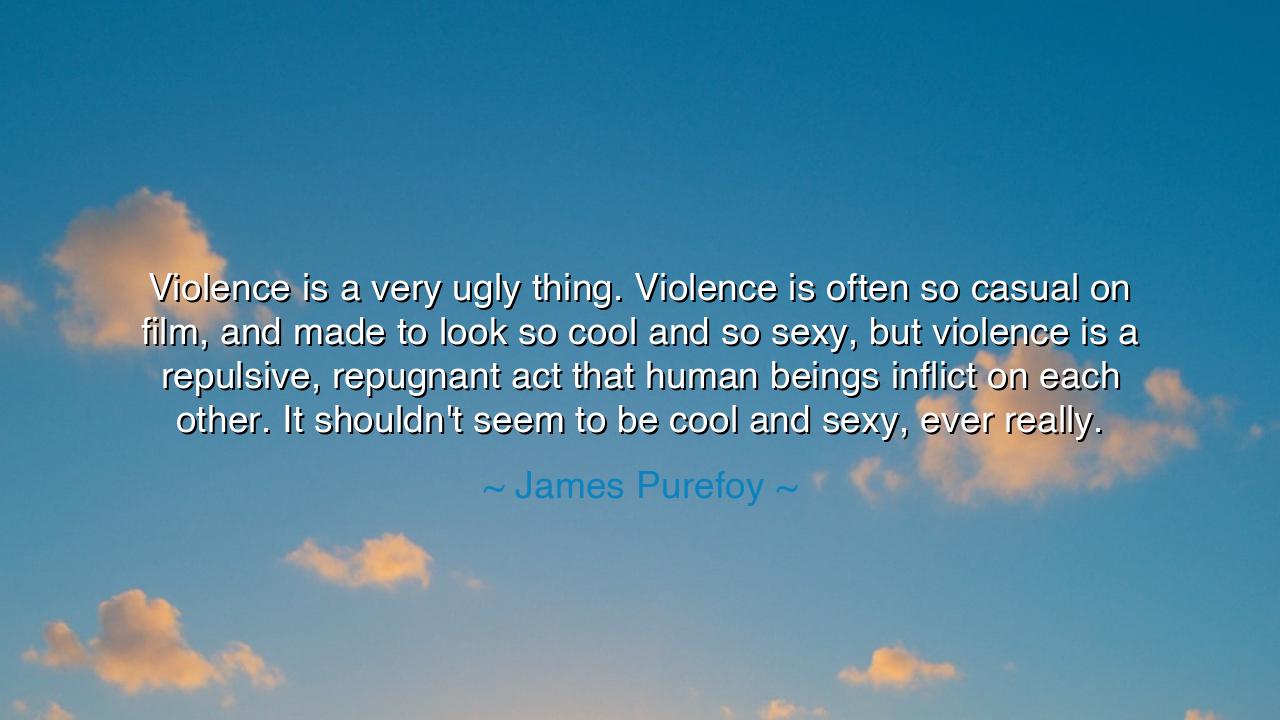
Violence is a very ugly thing. Violence is often so casual on
Violence is a very ugly thing. Violence is often so casual on film, and made to look so cool and so sexy, but violence is a repulsive, repugnant act that human beings inflict on each other. It shouldn't seem to be cool and sexy, ever really.






In the annals of human history, there is perhaps no force more destructive, more repugnant, than violence. James Purefoy, in his reflection on the depiction of violence in modern culture, reminds us of the ugliness of this act: "Violence is a very ugly thing. Violence is often so casual on film, and made to look so cool and so sexy, but violence is a repulsive, repugnant act that human beings inflict on each other. It shouldn't seem to be cool and sexy, ever really." These words speak not only to the discomfort we should feel when confronted with violence, but to the danger of glorifying it, of turning something ugly and harmful into something appealing or desirable.
In the ancient world, the wisdom of sages and philosophers often revolved around the consequences of violence. The Greek philosophers understood that while war and conflict were sometimes necessary, they were never to be glorified. Aristotle wrote that violence, though sometimes a tool for political or military power, was never virtuous. True strength, he believed, came not from the ability to cause harm, but from the ability to act with justice and restraint. Plato, too, in his Republic, cautioned against the seductive allure of power and aggression, emphasizing that the true harmony of the soul and the state came from reason and peace, not from violent conquests. The ancients saw violence as a necessary evil, but always something to be avoided when possible, never something to be celebrated.
Consider the story of Alexander the Great, whose military conquests reshaped the ancient world. While he is remembered as one of the greatest military minds, his victories were often marked by bloodshed and brutality. Despite his achievements, Alexander’s actions raised profound moral questions about the costs of empire and the human toll of violence. His victories brought about incredible change, but also immense suffering. As with many figures of power, his legacy is mixed, reminding us that even those who wield great might cannot escape the moral consequences of violence. The ancient world, while capable of great heroism and advancement, also recognized that the destructive nature of violence left scars that endured long after the battles were won.
In modern times, films and television have increasingly presented violence as something exciting or glamorous—a tool for heroes or villains, something that might bring instant gratification or victory. Yet, James Purefoy correctly points out the danger in presenting violence as anything other than what it truly is—ugly and harmful. When we depict violence as cool or sexy, we risk desensitizing the public, especially younger generations, to its true nature. It becomes a tool for entertainment, divorced from the suffering it causes. In doing so, we can lose sight of the moral cost of violence, and begin to treat it as just another dramatic effect, a quick thrill, rather than a destructive force that can ruin lives and tear societies apart.
Take the example of Gandhi, whose commitment to non-violence became a hallmark of his leadership in India’s fight for independence. Gandhi's rejection of violence was not merely a political stance; it was a philosophical and spiritual conviction. He believed that true strength was found in restraint and peace, not in the destruction of others. His movement, while deeply challenging to the powers that be, was rooted in the idea that non-violence was the most powerful tool for creating lasting change. Gandhi’s philosophy demonstrates that even in the face of overwhelming oppression, violence is not the only option—peace, rooted in understanding and love, is a far more powerful force.
The lesson embedded in James Purefoy’s words is one of moral clarity. Violence should never be seen as heroic or desirable. It is a force of destruction, not creation, a corruption of the soul, not a means of self-expression. When we glorify it—whether in films, video games, or even in our language—we risk losing touch with its true consequences. True strength lies not in the ability to harm others but in the ability to build, to heal, and to live with restraint. Violence, when justified, may seem inevitable, but it is always a tragic necessity, never an admirable choice.
In your own life, take a moment to reflect on the ways that violence may be normalized or glorified in the media, in your social circles, or in your own actions. How can you choose peace over aggression, understanding over retaliation? Whether in your relationships, your community, or your work, you have the power to act with restraint and compassion, to be a force of healing rather than harm. Like Gandhi, like the ancient philosophers, we can choose a life that seeks to reduce harm and increase understanding, seeing violence not as a solution, but as a problem to be avoided at all costs. Let us, in our own lives, be conscious of how we treat others and the messages we send—whether through words, actions, or the media we consume—choosing instead the path of peace.






AAdministratorAdministrator
Welcome, honored guests. Please leave a comment, we will respond soon